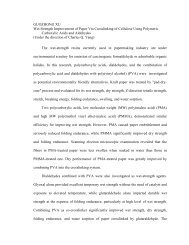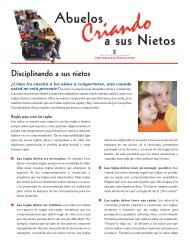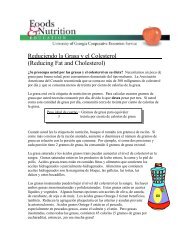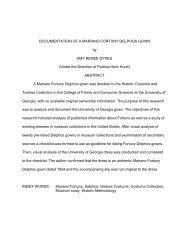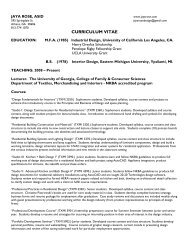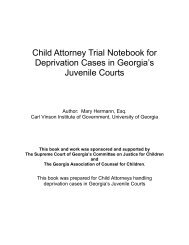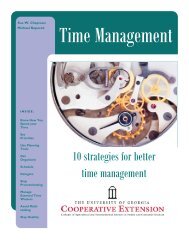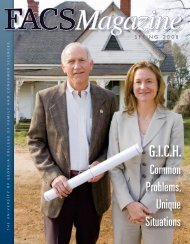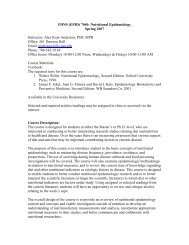Dr. Lynn Bailey - College of Family and Consumer Sciences
Dr. Lynn Bailey - College of Family and Consumer Sciences
Dr. Lynn Bailey - College of Family and Consumer Sciences
Create successful ePaper yourself
Turn your PDF publications into a flip-book with our unique Google optimized e-Paper software.
At 16, there was <strong>Lynn</strong> <strong>Bailey</strong><br />
on WIS’s live morning show,<br />
using flip charts, food samples<br />
<strong>and</strong> a doll to demonstrate her<br />
knowledge <strong>of</strong> nutrition: knowledge<br />
that had earned her a spot in the 1965<br />
National 4-H Congress.<br />
The town <strong>of</strong> Wagener, S.C., population<br />
1,000, was busting its buttons,<br />
glued to TV sets, watching the hometown<br />
girl who’d already bested thous<strong>and</strong>s<br />
<strong>of</strong> kids from bigger towns to win<br />
first place at the state level. They celebrated<br />
her success a few weeks later,<br />
when she boarded a plane in Columbia<br />
— she remembers vividly her feathered<br />
hat <strong>and</strong> heels — bound for the<br />
national event in Chicago.<br />
She proudly represented the state<br />
<strong>and</strong> her hometown at the National 4-H<br />
Congress <strong>and</strong> returned to Wagener<br />
even more enthusiastic about her<br />
goal to pursue nutritional science as a<br />
career.<br />
Even after all that, her first casual<br />
mention that she might like to become<br />
a university pr<strong>of</strong>essor someday didn’t<br />
get much serious consideration.<br />
“All <strong>of</strong> my friends thought it was<br />
hilarious,” she said.<br />
Wagener kids didn’t grow up to<br />
think big thoughts in ivory towers.<br />
They grew up to work — as store<br />
clerks, or laborers in the Wagener<br />
Shirt Factory. Or maybe at the nuclear<br />
power plant, like her dad, who put in<br />
hard hours as a steamfitter.<br />
Her mother went to college for a<br />
year, but was called back home to<br />
pick cotton — a disappointment that<br />
gnawed at her for years. She eventually<br />
became the librarian she’d hoped to be<br />
(<strong>and</strong> started the town’s library, which<br />
still bears her name), but without the<br />
benefit <strong>of</strong> a college degree.<br />
Fortunately, <strong>Bailey</strong>’s 4-H extension<br />
specialist, Alpha Jenkins, didn’t think<br />
it was silly for a young girl to hope for<br />
a career in academia.<br />
“She told me ‘yes, <strong>Lynn</strong>, I think you<br />
can do this,’” <strong>Bailey</strong> recalls. “I felt so<br />
inspired by that one person believing<br />
I could do it — that really stayed with<br />
me.”<br />
It wouldn’t be the last time an influential<br />
mentor would make a difference<br />
to <strong>Bailey</strong> — UF’s 2008 Teacher/<br />
Scholar <strong>of</strong> the Year <strong>and</strong> a renowned<br />
folate expert. Her research program<br />
<strong>and</strong> government advisory work contributed<br />
to major changes in recommended<br />
folate intake, a shared effort<br />
that resulted in significant drops in<br />
neural tube birth defects like spina<br />
bifida around the globe.<br />
After earning her undergraduate<br />
degree at Winthrop, a master’s at<br />
Clemson, <strong>and</strong> her Ph.D. at Purdue, she<br />
had begun working at Purdue, studying<br />
protein as a means to find ways to<br />
create more nutritious corn for developing<br />
countries. In short, she meant to<br />
help end world hunger.<br />
But without an on-campus medical<br />
school, the logistics <strong>of</strong> her human metabolic<br />
studies were challenging. UF<br />
had one.<br />
Arriving in Gainesville in 1977,<br />
she actively sought out another mentor,<br />
someone she could bounce her<br />
research ideas <strong>of</strong>f <strong>of</strong>; someone she<br />
sensed had her best interest at heart.<br />
She found one in Jim Dinning, a worldrenowned<br />
folate expert who had<br />
retired from a dean’s post in Thail<strong>and</strong>.<br />
He’d seen the numbers <strong>of</strong> children<br />
in developing countries with birth<br />
defects, <strong>and</strong> he felt in his gut that<br />
folate would be key to reducing those<br />
numbers.<br />
Instead <strong>of</strong> malnutrition, Dinning<br />
argued to <strong>Bailey</strong>, she needed to change<br />
the whole focus <strong>of</strong> her research to<br />
folate <strong>and</strong> birth defects.<br />
She did.<br />
He was right.<br />
<strong>Bailey</strong>’s research group generated<br />
data instrumental in establishing<br />
(Photo left) IFAS’ <strong>Lynn</strong> <strong>Bailey</strong>, a world-renowned folate researcher, was honored as UF’s 2008 Teacher/<br />
Scholar <strong>of</strong> the Year. <strong>Bailey</strong>, a South Carolina native, credits her 4-H roots with sparking an interest<br />
in nutrition <strong>and</strong> putting her on the path to a career in science. Shown at UF’s Baby Gator playground,<br />
<strong>Bailey</strong> has helped prevent birth defects in children around the world. photo by eric zamora<br />
folate-intake recommendations,<br />
including those for pregnant women,<br />
<strong>and</strong> her name grew synonymous<br />
with folate. By the early 1990s, she<br />
was named to a U. S. Food <strong>and</strong> <strong>Dr</strong>ug<br />
Administration committee whose recommendations<br />
were adopted as law in<br />
1996 — m<strong>and</strong>ating that all enriched<br />
foods in the United States be fortified<br />
with folic acid.<br />
“It wasn’t until the 1980s, early<br />
1990s that we got the evidence that<br />
showed he was right,” she said. “But I<br />
trusted him.”<br />
Now just four years away from<br />
retirement, she hopes to stay actively<br />
involved in her ongoing research<br />
as well as folate-related work at the<br />
national <strong>and</strong> international levels as a<br />
pr<strong>of</strong>essor emeritus. And she’s enjoying<br />
the pay<strong>of</strong>f <strong>of</strong> years spent mentoring<br />
young academic minds — like Marie<br />
Caudill, now on the faculty at Cornell,<br />
<strong>and</strong> Karla Shelnutt, who earned her<br />
Ph.D. under <strong>Bailey</strong>’s tutelage.<br />
“Everything I know I’ve learned<br />
from that woman,” says Shelnutt, who<br />
now teaches a nutrition <strong>and</strong> metabolism<br />
class with <strong>Bailey</strong> at UF. “She’s<br />
amazing.”<br />
Looking back on her career, <strong>Bailey</strong><br />
says l<strong>and</strong>ing at UF — <strong>and</strong> IFAS — was<br />
an ideal fit. She loves the idea <strong>of</strong> working<br />
in a place where extension works<br />
to get research out to the public —<br />
especially to inquisitive kids from onestoplight<br />
towns.<br />
“Growing up, I had this concept that<br />
if you went to college you could answer<br />
all these questions,” she said. “Being<br />
in IFAS is wonderful for me. I love<br />
that there’s this chance for kids out in<br />
rural communities to be inspired by a<br />
county 4-H agent. It’s like coming back<br />
to my roots.” U — mickie <strong>and</strong>erson<br />
pr<strong>of</strong>ile<br />
IMPACT | Fall 2008 13



